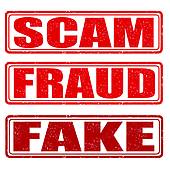National Center for Disaster Fraud: Avoiding Disaster Frauds & Scams

The U.S. Department of Justice established the National Center for Disaster Fraud to bring awareness to the public about fraudulent and criminal activity surrounding disasters. Disaster Frauds, Scams and Fake organizations can be avoided if specific guidelines are followed.
Certain elements in our society tend to prey on those who are vulnerable and naive. Especially those who are victims of natural disasters such as the most recent event in Texas (Hurricane Harvey.)
At a time of such vulnerability, criminals can exploit victims through fake websites which are put up overnight to solicit contributions and various solicitations. Those solicitations can include the following: websites, emails, phone calls, mailings, and door to door collections.
If you or someone you know suspect fraudulent activity, you can contact the National Center for Disaster Fraud at (866) 720-5721. That contact number can be confirmed by visiting the FBI website: www.fbi.gov or via email at: disaster@leo.gov. If you are in Texas, you can contact the Office of the Attorney General toll-free 1-800-252-8011 or via website: www.texasattorneygeneral.gov
When billions of dollars are poured into a disaster area, everyone wants whats coming to them, even those who have no right to relief funds or benefits.
The public should be aware of the various forms of fraudulent communication and how to detect fraudulent criminal activity. Before making any contribution to any organization, you should consider the following before donating money:
- Do not respond to unsolicited emails, do not open any attachments or click on links
- Be skeptical of charitable organizations who you have not made contact with asking for donations via email.
- Be weary of organizations with copy cat names to legitimate charities
- Verify the legitimacy of a charitable organization by utilizing credible online resources
- Do not click on unknown links
- Make contributions directly to a familiar charitable organization. Do not let anyone donate on your behalf
- Do not be pressured into making a contribution, reputable organizations do not act in this manner
- Do not give your personal or financial information to any person soliciting for contributions.
- Avoid cash donations, stay on the paper trail by using credit or debit cards, or checks. Checks should be made directly to the organization and not any individual.
- Remember that most legitimate charitable organizations websites end in .org and not .com
For more information, you can contact the National Center for Disaster Fraud at (866) 720-5721. Suspicious email solicitations or suspected fraudulent websites can be reported to the FBI’s Internet Crime Complaint Center: www.ic3.gov
